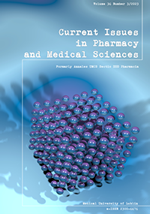Quality of life of lung cancer patients
DOI:
https://doi.org/10.2478/cipms-2023-0025Keywords:
quality of life, lung cancer, socio-psychological supportAbstract
Lung cancer is one of the most prevalent forms of cancer in patients in Ukraine. The objective of the study was to identify the main problems in the quality of life of patients with lung cancer in order to optimize medical care for this patient group. A survey of 411 patients of oncology institutions in nine regions of Ukraine was conducted in the period from November 2021 to February 2022. The sociological survey was performed using the EORTC QLQ-C30 and QLQ-LC29 questionnaires. As of the pre-war period, the quality of life of lung cancer patients in Ukraine amounted to 49.12 points on a 100-point scale. According to the QLQ-C30 symptom scale, the highest score among the complaints of Ukrainian patients is that of financial difficulties, the second place is occupied by fatigue. According to the QLQ-LC29 symptom scale, patients with lung cancer were most concerned with “Fear of progression”. Ukrainian patients were least concerned about diarrhea and hemoptysis. When providing medical care to cancer patients, components to ensure the proper quality of their lives and psychosocial care, including the standardization of psychological care and its introduction in all institutions that provide medical care to cancer patients; organization of social and psychological support for cancer patients and their families; as well as educational work with relatives, colleagues, medical professionals on awareness of the need for social and psychological support for patients must be taken into account.References
1. Center for Public Health of the Ministry of Health of Ukraine. In 2019, tumors became the second most common cause of death of Ukrainians. Conclusions from the study of the global burden of disease. [https://phc.org.ua/news/u-2019-roci-novoutvorennya-stali-drugoyu-naychastishoyu-prichinoyu-smerti-ukrainciv-visnovki-z] (access: 6.06.2022).
2. Center for Public Health of the Ministry of Health of Ukraine. What is important to know about lung cancer. [https://www.phc.org.ua/news/scho-vazhlivo-znati-pro-rak-legen] (access: 6.06 2022).
3. World Health Organization. Cancer. [https://www.who.int/news-room/fact-sheets/detail/cancer] (access: 6.06.2022).
4. Adapted evidence-based clinical guidelines. Lung cancer. [https://www.dec.gov.ua/wp-content/uploads/2019/11/2014_387-akn-raklegeni.pdf] (access: 6.06.2022).
5. The World Health Organization Quality of Life assessment (WHOQOL): position paper from the World Health Organization. Soc Sci Med. 1995;41(10):140309.
6. Gutor TG, Zaremba NI, Kovalska OR, Moskviak-Lesniak DJ, Gerasymovych JM, Kobyletskyy OJ. Comparative analysis of the main social health determinants of life expectancy and infant mortality in Ukraine and Poland. Wiad Lek. 2021;74(3, part 2):75055.
7. Riba MB, Donovan KA, Andersen B, Braun J, Breitbart WS, Brewer BW. Distress management, version 3.2019, NCCN clinical practice guidelines in oncology. JNCCN. 2019;17(10):1229249.
8. Lung cancer (update of QLQ-LC13). [https://qol.eortc.org/questionnaire/qlq-lc29/] (access: 10.11 2021).
9. Koch M, Hjermstad MJ, Tomaszewski K, Tomaszewska I, Hornskien K, Harle A, et al. Gender effects on quality of life and symptom burden in patients with lung cancer: results from a prospective, cross-cultural, multi-center study. J Thorac Dis. 2020;12(8):4253261.
10. Keller M, Sommerfeldt S, Fischer C, Knight L, Riesbeck M, Lowe B, et al. Recognition of distress and psychiatric morbidity in cancer patients: a multi-method approach. Ann Oncol. 2004;15(8):124349.
11. Kyiv City Clinical Oncology Center. Lung cancer: types and symptoms of the disease. [https://onko.com.ua/patsiientam/korysna-informatsiia/rak-leheniv-vydy-i-symptomy-zakhvoriuvannia.html] (access: 10.06.2022).
12. National Cancer Institute. The most common symptoms of lung cancer. [https://unci.org.ua/najposhyrenishi-symptomy-raku-legen/] (access: 6.06.2022).
13. Velikova G, Booth L, Smith AB, Brown PM, Lynch P, Brown JM, et al. Measuring quality of life in routine oncology practice improves communication and patient well-being: a randomized controlled trial. J Clin Oncol. 2004;22(4):714724.
14. Strittmatter G, Tilkorn M, Mawick R. How to identify patients in need of psychological intervention. Recent Results Cancer Res. 2002;160:353361.
15. Brix C, Schleussner C, Fuller J, Roehring B, Wendt TG, Strauss B. The need for psychosocial support and its determinants in a sample of patients undergoing radiooncological treatment of cancer. J Psychosom Res. 2008;65(6):54148.
16. Koch M, Gräfenstein L, Karnosky J, Schulz C, Koller M. Psychosocial Burden and Quality of Life of Lung Cancer Patients: Results of the EORTC QLQ-C30/QLQ-LC29 Questionnaire and Hornheide Screening Instrument. Cancer Manag Res. 2021;13:619197.
17. Ford S, Lewis S, Fallowfield L. Psychological morbidity in newly referred patients with cancer. J Psychosom Res. 1995;39(2):193-202.
18. Vodermaier A, Linden W, MacKenzie R, Marshall C. Disease stage predicts post-diagnosis anxiety and depression only in some types of cancer. Br J Cancer. 2011;105(12):181417.
19. Riedl D, Gastl R, Gamper E, Dejaco D, Schoellmann F, Rumpald G, et al. Cancer patients’ wish for psychological support during outpatient radiation therapy: findings from a psychooncological monitoring program in clinical routine. Strahlentherapie und Onkologie. 2018;194(7):655663.
20. de Zwaan M, Mosch P, Sinzinger H, Stresing K, Oberhof P, Kohl C, et al.[The association between the need for psychosocial support, patients’ desire for psychosocial support and received psychosocial interventions in cancer patient]. Neuropsychiatrie. 2012;26(4):15258
Downloads
Published
Issue
Section
License
Copyright (c) 2023 Authors

This work is licensed under a Creative Commons Attribution-NonCommercial-NoDerivatives 3.0 Unported License.


